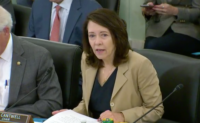Highway Infrastructure
Senate Committee Unanimously Approves 5-Year, $304B Highway Bill

Senate Environment and Public Works Chairman Tom Carper (D-Del.).
Photo: Screen Shot/Senate Environment and Public Works Committee
In a rare case of congressional bipartisanship, the Senate Environment and Public Works Committee has approved a five-year, $303.5-billion highway measure. The May 26 vote on the bill—a high legislative priority for construction, engineering and transportation groups—was 20-0.
Committee Chairman Tom Carper (D-Del.) said the new bill’s funding represents an increase of about 34% over the levels in the last multi-year highway legislation, the 2015 Fixing America’s Surface Transportation, or FAST, Act.
The unanimous bipartisan support of the highway measure is a sharp contrast with the struggles White House and Senate Republican negotiators have had in reaching an agreement on a broader multi-sector infrastructure package.
The highway bill could move as stand-alone legislation, but it might also be part of that more sweeping infrastructure measure.
The committee’s top Republican, Shelley Moore Capito (W.Va.)—who also is the GOP’s lead negotiator in the White House talks—sees the highway measure as connected to the infrastructure negotiations. She said, “This bill, I think, is really the anchor to those bipartisan discussions.”
The Senate panel's new highway bill is the largest component of a surface transportation package.
Still to come are sections dealing with transit, highway safety and, most crucially, revenue. Those areas fall under the jurisdiction of the Banking, Commerce and Finance committees, respectively.
Banking Committee Chaiman Sherrod Brown (D-Ohio) is working with the panel's top Republican, Patrick Toomey (Pa.) on reauthorizing the transit program, according to Brown's office.
Now that the EPW panel has voted, Brown intends for the committee to provide a substantial public-transportation title, according to his office. No Banking Committee voting session on the transit title has yet been scheduled,
Action in the House also will be necessary. House Transportation and Infrastructure Committee Chairman Peter DeFazio (D-Ore.) praised the Senate panel’s vote as “an important first step" toward a surface transportation bill.
“I’ll be marking up my own bill in the coming weeks that will make transformational investments to move our infrastructure out of the 1950s and into the modern era in a way that creates jobs, restores America’s global competitiveness, and reduces pollution from the transportation sector," DeFazio said in a statement.
Legislators face a tight deadline for passing a bill. They must act by Sept. 30, when an existing FAST Act extension will lapse.
Within the new measure's increased overall funding is $18 billion to reduce climate emissions in transportation, including $2.5 billion to construct charging stations for electric vehicles and fueling stations for vehicles powered by hydrogen cells.
It also would provide $500 million to make infrastructure better able to withstand hurricanes, wildfires and other effects of climate change.
Another provision would address what Carper termed transportation "inequity"—past transportation projects "that have divided and harmed too many neighborhoods across our nation.”
He said, "We know that past investments in transportation programs have left far too many Americans, especially those in communities of color, behind."
As an example, he pointed to the division and problems caused by the construction in the 1960s and 1970s of Interstate-95 in Wilmington in his home state.
Capito noted that 90% of the highway bill’s funding would be distributed via formula to the states. That provision will give states “the flexibility and the certainty necessary to get those projects," she said.
"There is a lot in this bill for both sides," she said, highlighting a provision to speed federal regulatory approvals for transportation projects—long a priority for industry but opposed by environmental groups.
It would codify the “One Federal Decision” initiative created in a 2017 executive order signed by then-President Donald Trump.
That directive set a goal of completing federal reviews of major infrastructure projects within two years, but it lacked the clout of federal legislation.
Linda Bauer Darr, American Council of Engineering Companies' president and CEO, said the One Final Decision provision “is crucial for engineering firms conducting environmental reviews, advising on mitigation measures and acting as trusted advisors for clients navigating federal and state regulatory requirements."
Capito also cited the bill’s $2-billion Rural Surface Transportation Grant program. As with the popular INFRA (formerly TIGER) grants, the new grants would be awarded via competitions among the states and other applicants. In addition, the measure would create a separate discretionary grant program for bridges.
Paraphrasing Winston Churchill, Carper said the committee’s vote is not the "beginning of the end" of congressional action on surface transportation/ Rather, he said, “This is the end of the beginning.”
Carper said, "We still have plenty of work to do but one hell of a lot of work has been done.”



